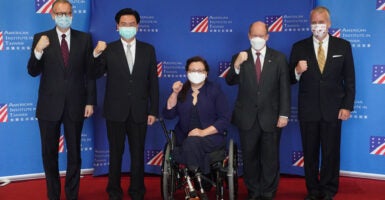A “very vicious political provocation.”
That’s what China’s Ministry of National Defense called a June visit by three U.S. senators to Taiwan.
The purpose of the visit was to show bipartisan American support for the island nation by announcing a generous donation of nearly a million vaccine doses.
Sounds vicious, right?
On June 6, those three U.S. senators—Democrats Tammy Duckworth of Illinois and Christopher Coons of Delaware, and Republican Dan Sullivan of Alaska—visited Taipei aboard a U.S. Air Force C-17 Globemaster III.
Taiwanese media reported that that was the first U.S. C-17 visit there in at least 25 years. The senators met with Taiwanese President Tsai Ing-wen and announced that the U.S. would be sending 750,000 vaccine doses to the country, which is facing a vaccine shortage amid climbing coronavirus cases.
Brent Christensen, director of the American Institute in Taiwan, called the vaccines “proof of America’s commitment to Taiwan,” affirming that “Taiwan is a family member to the world’s democratic countries.”
But that’s not all.
The U.S. has since tripled its vaccine pledge, sending 2.5 million doses of the Moderna vaccine to Taiwan on June 20. Other countries are also showing their support: In early June, Japan donated 1.2 million doses. Lithuania also recently agreed to donate 20,000 doses of the AstraZeneca vaccine to Taiwan.
It’s crucial that the U.S. stands up for its democratic partner.
Taiwan is a country that holds elections, provides its citizens with economic and political freedom, and doesn’t commit atrocious human rights violations.
By supporting Taiwan, not only does the U.S. reaffirm its defense of global democracy, it also sends a strong message to China.
Beijing’s threats and bullying tactics should incentivize the U.S. to develop even closer ties with Taiwan. Luckily, that’s just what the U.S. seems to be doing.
On June 30, Christensen, along with Hsiao Bi-khim, Taiwan’s representative in the U.S., held videoconference talks with members of the Office of the U.S. Trade Representative and Taiwan’s trade office.
In addition, Raymond Greene, deputy director of the American de facto embassy in Taiwan, said recently: “The United States no longer sees Taiwan as a ‘problem’ in our relations with China. We see it as an opportunity to advance our shared vision for a free and open Indo-Pacific, and also as a beacon to peoples around the world who aspire for a more just, safe, prosperous, and democratic world.”
A bilateral investment pact with Taiwan would be enormously beneficial.
According to The Heritage Foundation’s 2021 Index of Economic Freedom, Taiwan’s economy ranks sixth-freest in the world. Taiwan’s vast production of microchips make it a “fertile investment opportunity,” according to a letter from the House of Representatives to President Joe Biden.
Taiwan is already one of the U.S.’ top export partners, receiving $68 billion worth of exports in 2020 alone. A free trade agreement would serve to strengthen existing ties and demonstrate American commitments in the Indo-Pacific.
The U.S. isn’t the only country working toward developing closer relations with Taiwan. Japan’s ruling Liberal Democratic Party has called for closer ties with Taiwan and encouraged technological collaboration. Lithuania is also taking steps to open a business office on the island, among others in Europe.
The U.S.’ path forward is clear: Now is the time to continue to work toward negotiating an effective free trade agreement with Taiwan to foster mutual prosperity.
Editor’s note: This article has been updated to correct the number of vaccines donated to Taiwan by Lithuania.
Have an opinion about this article? To sound off, please email [email protected] and we’ll consider publishing your edited remarks in our regular “We Hear You” feature. Remember to include the url or headline of the article plus your name and town and/or state.































